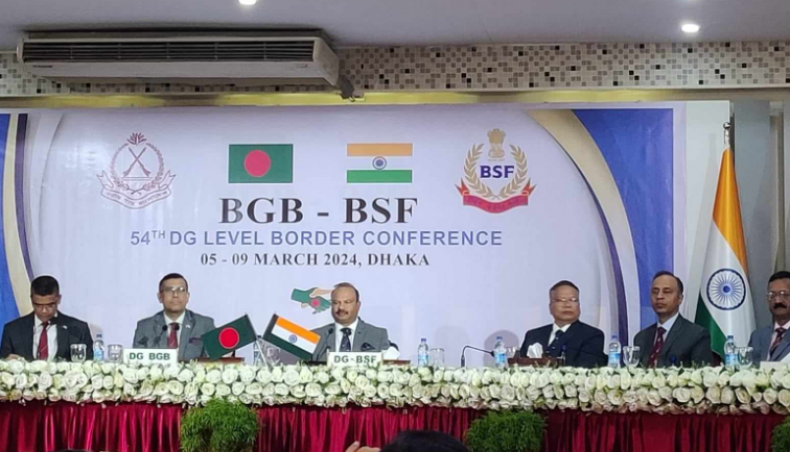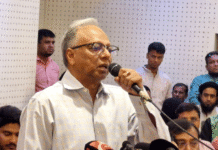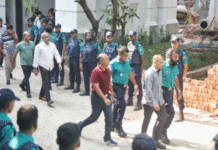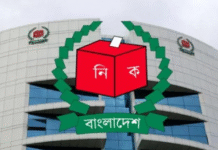
The Indian Border Security Force in the latest director general-level meeting with the Bangladeshi border force has renewed its promise to bring down the number of shooting deaths or injuring Bangladeshi civilians along their shared border to zero.
In the 54th director general-level border conference, Border Guard Bangladesh director general Mohammad Ashrafuzzaman Siddiqui urged his Indian counterpart to adopt ‘necessary measures’ to reduce the border killings to zero considering the ‘sound bilateral relation’ existing between the two neighbours.
The biyearly conference between the two border forces held in Dhaka city commenced on March 5 to conclude on Saturday with the signing of the joint record of discussion.
In the joint statement, both sides agreed on bringing down the killing or injuring of unarmed Bangladeshi nationals to zero by enhancing joint patrols, vigilance, intensifying public awareness programme to uphold the spirit of a joint statement made by the prime ministers of both the countries in September 2022.
Such a meeting takes place twice a year in each of which the Indian forces have promised to bring down the border killings to zero.
But the promise was never kept, according to rights activists.
At least 20 Bangladeshi nationals, including a BGB member, have been killed in the firing of the Indian BSF since June 2023, according to rights group Ain O Salish Kendra.
Rights group ASK documented that 30 Bangladeshis were killed at the hands of the Indian BSF in 2023 alone, while the number was 23, including 16 shooting deaths, in 2022.
In 2021, the number of shooting deaths was 16, and another was reportedly tortured to death. The rights group recorded 42 shooting deaths in 2020.
At least 1,236 Bangladeshis were killed and 1,145 injured in the shooting by the Indian border force between 2000 and 2020, according to another rights group Odhikar.
In the joint press meet, the BSF chief, Nitin Agrawal, an Indian Police Service officer of the 1989 Kerala cadre, claimed that the civilian deaths were the results of self-defence and termed the civilians killed along the borders ‘criminals’, but the BGB chief termed the civilians killed along the borders ‘miscreants’ and expected no such killings to take place.
When asked why the BSF members do not use body-worn cameras or launch joint inquiries over the scores border killings, the BSF chief did not give any direct reply, but said that they have changed their weapon policy for using pump-action guns on Bangladesh border to bring casualties down.
Replying to another question on killing patterns that repeatedly show that Bangladeshi nationals received bullets on sensitive parts or upper portion of their body, the BSF chief said that although their personnel used non-lethal weapons but some ‘criminals’ with sharp weapons reached so close that the personnel had to act in self-defence.
With a force of over 2.65 lakh personnel, the BSF is India’s leading security agency responsible for safeguarding its 4,100-kilometre-long international borders with Pakistan and Bangladesh.
Asked about similar killing of BGB sepoy Mohammad Roisuddin on the border, Nitin Agrawal declined to offer details, but said that they have shared information with their Bangladeshi counterpart.
The BGB chief at this question added that the death of Mohammad Roisuddin was not a ‘targeted killing’.
‘The incident occurred in darkness as a result of confusion on both sides,’ he said, noting that both parties have agreed on a collective effort to prevent any loss of life among uniformed personnel, be it BSF or BGB, as well as among civilian Bangladeshi or Indian nationals.
According to the joint press release, BSF chief expressed his sincere condolences for the sad demise of Roisuddin in the ‘unfortunate incident’.
Roisuddin succumbed to injuries sustained from being shot by the Indian BSF along the Dhanyokhola-Jelepara border in Jashore’s Benapole upazila on January 22.
Both sides agreed to sensitise the border populace to refrain from illegal crossing, smuggling, human trafficking, uprooting border pillars and other trans-border crimes.
The BSF chief, when urged by the BGB chief, assured of an expeditious execution in re-opening the remaining portion of the Rahimpur Khal, linked with the Kusiyara River, to facilitate irrigation.
The BSF chief also responded positively when the BGB director general requested him to pursue with the appropriate Indian authorities regarding the laying of the optical fibre network to connect Dahagram through Tin Bigha corridor under the project ‘connected Bangladesh’.
To reduce the impact of the contaminated water carried from India by four canals in Akhaura area, both sides have agreed to conduct a joint survey and take necessary actions to prevent health hazards of the local people.
Both sides also agreed to expedite road connectivity.
Both sides agreed on remaining cautious and steadfast to stop smuggling through sharing of real time information and investigation reports of traffickers and remaining extra vigilant in line with the ‘Coordinated Border Management Plan’ in curbing the menace of smuggling of various types of drugs and narcotics, fire arms-ammunitions, explosives, gold, fake Indian currency note, and other contraband items.
New Age









